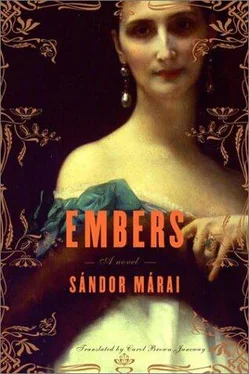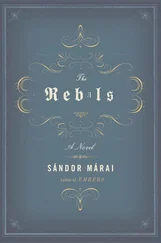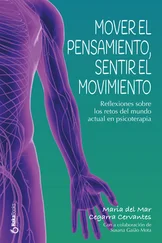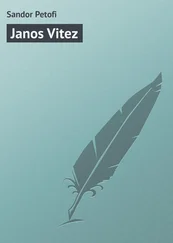I know none of that yet. You both cut me out of the conversation, because I know nothing about the tropics. Later, when I realize that you had been deceiving me that night, I think back to this scene, I hear the words, even though they faded long ago, and I am forced to admit, in genuine admiration, that the two of you played your roles perfectly. I, the uninitiated, can find nothing suspicious in your words: you talk about the tropics, about a book, about an ordinary piece of reading. You want to know what Krisztina thinks, you are particularly interested in whether someone born and raised in another part of the world could tolerate the conditions in the tropics … what does she think? (You don’t ask me.) And could she herself tolerate the rain, the warm haze, the suffocating hot mists, the loneliness in the swamps and the primeval forest … you see, the words come back of their own accord. The last time you sat in this armchair, forty-one years ago, you talked about the tropics, the swamps, the warm mists, and the rain. And just now, when you returned to this house, there they were again, words like swamp, and the tropics, and rain, and hot mist. Yes, words come back. Everything comes back, words and things go round in a circle, sometimes they circle the entire globe and then they finally return to their starting point and something is completed,” he says calmly. “That was what you talked about, the last time you spoke to Krisztina. Around midnight, you order the carriage and are driven back to town. Those were the events on the day of the hunt,” he says, and his voice expresses the satisfaction of an old man who has just successfully delivered an exact report, a systematic recapitulation that commands attention.
when you leave, Krisztina also withdraws, he says after a moment. “I remain alone in this room. She has left the English book on the tropics lying on chair. I have no desire to go to sleep, so I pick up the book and thumb through it. I look at the pictures, and try to involve myself with its statistics about the economy and public health. It surprises me that Krisztina is reading such a book. All this won’t concern her very much, I think, the mathematical curve of rubber production on the peninsula can’t be that interesting to her, nor the general health problems of the natives. It’s just not Krisztina, I think. But the book has something to say, not just in English and not just about living conditions on the peninsula. As I am sitting there, book in hand, after midnight, alone in the room after the two people who have meant the most to me, aside from my father, have left, it suddenly dawns on me that the book is another signal. And I realize something else. During the day, things have finally begun to impose themselves on my attention, something has happened, life has turned eloquent. At such moments, I think, great care is required, because on such days life is speaking to us in mute signs, everything suddenly makes us alert, everything is a proof and a symbol, all we need to do is understand. One day things mature and we can put words to them. And, as I think this, I suddenly understand that this book is both a sign and an answer. It is saying: Krisztina wants to leave here. She is thinking about strange worlds, which means she must want something other than this world. Perhaps she wants to run away from here, from something or someone-and this someone can be me, but it can also be you. It is as clear as daylight, I think, Krisztina feels and knows something, and she wants to get away from here, and that’s why she is reading a study of the tropics. I sense a great many things, and I feel that I also understand them. I feel and I understand what happened today: my life has split in two, like a l andscape torn apart by an earthquake. On the one side is childhood, you and everything that the past has meant, and on the other is a dark place through which I cannot see, but through which I must find my way: the remainder of my life. And the two parts of this life are no longer in contact with each other. What happened? I cannot say. I have spent the whole day in an effort to appear calm and in control of myself, and I succeeded; Krisztina could not yet know anything as she looked at me, her face pale and with that strange questioning stare. She could not know, could not read on my face, what had happened on the hunt … And indeed, what had happened? Am I not just imagining all this? Is the whole thing not just a figment of my imagination? If I tell it to anyone, he or she will probably laugh in my face. I have nothing, no proof, in my hand … All I have is a voice inside me, stronger than any proof, crying out unmistakably, incontrovertibly, beyond all doubt, that I am not deceiving myself, and that I know the truth. And the truth is that in the dawn, my friend wanted to kill me. What a ridiculous accusation, out of the empty air, isn’t it? Can I ever speak about this conviction, which is even more horrifying than the thing itself, to another human being? No. But now that I am in possession of this knowledge, with that calm certainty that accompanies our recognition of simple facts, how am I to imagine our future lives together? Can I look you in the eye, or should all three of us, Krisztina, you, and I, play the game and turn our friendship into pure theater while we all watch one another?
“Is it possible to live in such a way? As I said before, I think that perhaps you have gone mad. I think, perhaps it is the music. One cannot be a musician and a relative of Chopin and escape unpunished. But at the same time, I know that this hope is both cowardly and foolish: I have to look truth in the face, I must not imagine things, you are not mad, there is no relief, no way out. You have a reason to hate me and to want to kill me. I cannot grasp what that reason is. There is one simple, natural explanation, namely that you have been smitten with a sudden, wild passion for Krisztina, and this, too, could be a form of madness.
But this assumption is so implausible-there has been no trace, no sign whatever in the life the three of us have led together-that I have to discard it. I know Krisztina, I know you, and I know myself-at least I think I do. Our entire lives, our first acquaintance with Krisztina, my marriage, our friendship, it’s all so open, so clean, so transparent, the personalities and the circumstances are so unambiguous, that I would have to be insane to believe any such thing even for a second. Passions, no matter how perverse, cannot be concealed; a passion that compels the man possessed by it to pick up his weapon one day and turn it against his closest friend cannot be hidden from the world for months on end.
Even I, the perpetually blind and deaf third party, would have had to pick up some sign of it-we virtually live together; no week goes by in which you do not dine with me three or four times; during the day I am in town, in the barracks, serving alongside you; we know everything about each other. And I know Krisztina’s days and nights, her body and her soul, as well as I know my own. It’s a crazy notion, that you and Krisztina … and I am almost relieved when I make myself examine this notion. It must be something else. What happened is deeper, more mysterious, less comprehensible. I have to talk to you. Should I have someone observe you? Like the jealous husband in a c omedy? I am not a jealous husband. Suspicion has trouble taking hold in my nervous system, I am calm when I think about Krisztina, whom I found the way a collector finds the prize of his life, the rarest, most perfect object in his collection, the masterpiece, the goal and meaning of his existence.
Krisztina does not lie, Krisztina is not unfaithful, I know all her thoughts, even the secret ones that are thought only in dreams. The diary bound in yellow velvet that I gave her in the first days of our marriage tells everything, because we had agreed that she would write about her feelings and thoughts for me and for herself-her longings, her emotions, all the by-products of the soul that one dares not speak aloud because one is ashamed or sees them as irrelevant. She would sketch these out in the diary, share with me in a few words what she thought and felt under the influence of a particular person or a situation.
Читать дальше












